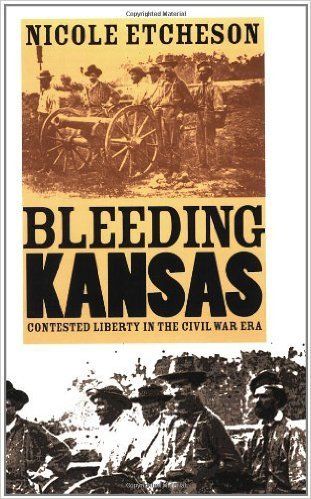
Continued from April 22 (reply #26).
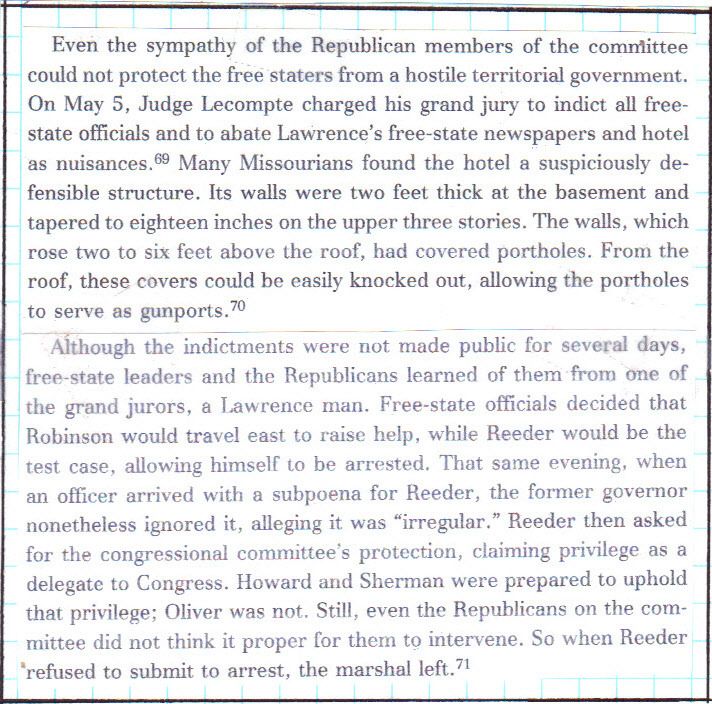
Nicole Etcheson, "Bleeding Kansas: Contested Liberty in the Civil War Era"
Posted on 05/01/2016 7:27:57 AM PDT by Homer_J_Simpson
Thanks, I'm not a fan of any of that new-fangled stuff -- Face Book, twitter, snap-chat... whatever, I don't get it.
So I mostly stick with old stone-age technology, you know, e-mail, texting & yes, Free Republic.
Here, when we want to say "like" it goes like this:
;-)
My “interpretation” of the Bible is that the Bible accepted slavery as a social norm of the era. It was never explicitly espoused as God’s Plan for his people, nor was it condemned as the inherent evil we see in it today. In the context of the era, human slavery was a social status consistent with the society in which it existed. For the same reasons, the Bible never explicitly condemned gladiator combat to the death, either.
Today, we see both of these things as inherently wrong. And I see no inconsistency in the Bible as being a spiritual journey for God’s people. As we “evolve” to be closer to God, we leave behind many of the once accepted social norms as no longer acceptable, such as slavery and gladitorial combat. I believe this is in fact God’s Plan for us. However, that is not to say that God didn’t warn us that there would be temptations to go down a false path in this spiritual evolution. He explicitly had Paul warn us about sexual sin and homosexuality, and today the social norms seem hell-bent on accepting them.
But back to the original premise, I do not believe you can make a case that God intended white people to own black people as property. It is certainly not consistent with the Great Commandment to go and make disciples of all the world.
Some safe zone. The caning of Senator Sumner was a macroaggression.

Continued from April 22 (reply #26).

Nicole Etcheson, "Bleeding Kansas: Contested Liberty in the Civil War Era"
Sorry FRiend, but you are not giving the Bible enough credit for our modern sensibilities.
And you're missing the key point here.
First of all, the Old Testament strongly distinguishes between God's people (Jews) and all others.
For Jews there are many rules & restrictions which don't apply to others.
Among those, Jews are forbidden from seizing captives, except in warfare, and are required to protect fugitive slaves, not return them.
The Bible also strongly distinguishes between temporary "slaves" (i.e., indentured servants) paying off debts, versus permanent slaves such as those captured in war.
God's people are strongly forbidden from keeping other Jews as permanent slaves.
That is key to understanding the fall of Judah.
Now, if you can grasp that setup concept (God's people are not to be permanent slaves), then wrap your mind around the punchline: All Christians, without exception, are God's people and therefore cannot be held as slaves, especially by other Christians.
So, once an African slave accepted Christ, the Bible required he or she be eventually freed.
And of course Christian masters are forbidden from keeping Christ secret from their slaves.
Bottom line, you cannot legitimately blame the Bible for slavery, especially the type practiced in the United States before the Civil War.
Sure, just Democrats doing what Democrats always do -- using force or violence to silence arguments they dislike.
Indeed, we might well reflect that Congress then was a “safe zone” in the same sense as “safe zones” today: safe for Democrats to rule with iron hands.
Not so safe for anyone else.
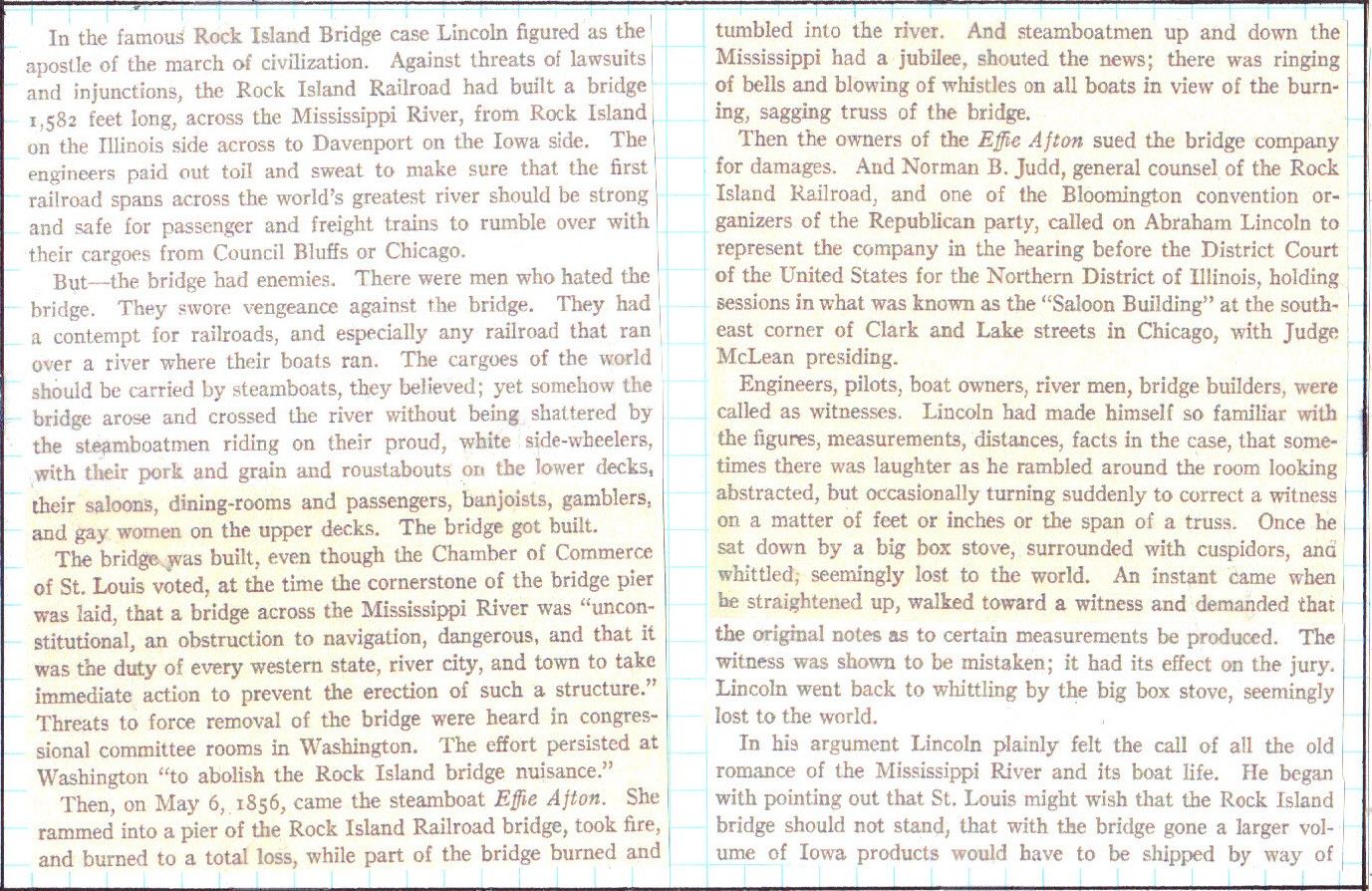
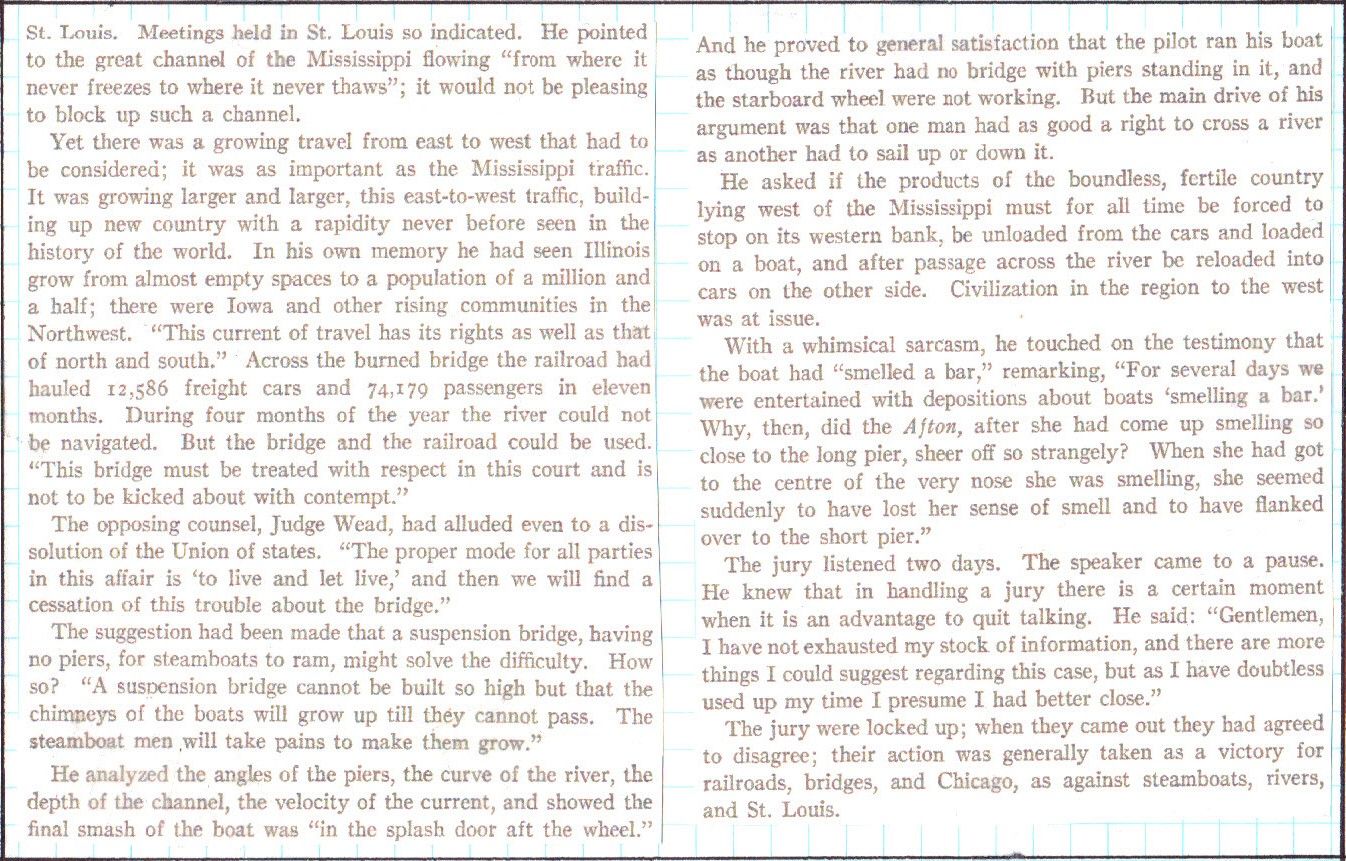
Carl Sandburg, Abraham Lincoln: The Prairie Years, Volume II
The concept of indentured servants was common law from England and adopted here. States began passing laws to deal with the new slave issues. It was a very intentional process on the state level.
Ever since the beginning of the Industrial Revolution, the Luddites have been trying to stop progress. Having been governed the last seven years by Luddites, we have seen what damage they can do.
Thanks for posting, interesting reading.
A very entertaining piece of writing by Sandberg! Much appreciated...
Yes, his historical accuracy may be open to question is some cases - as someone pointed out in a previous month - but he is usually entertaining and insightful.
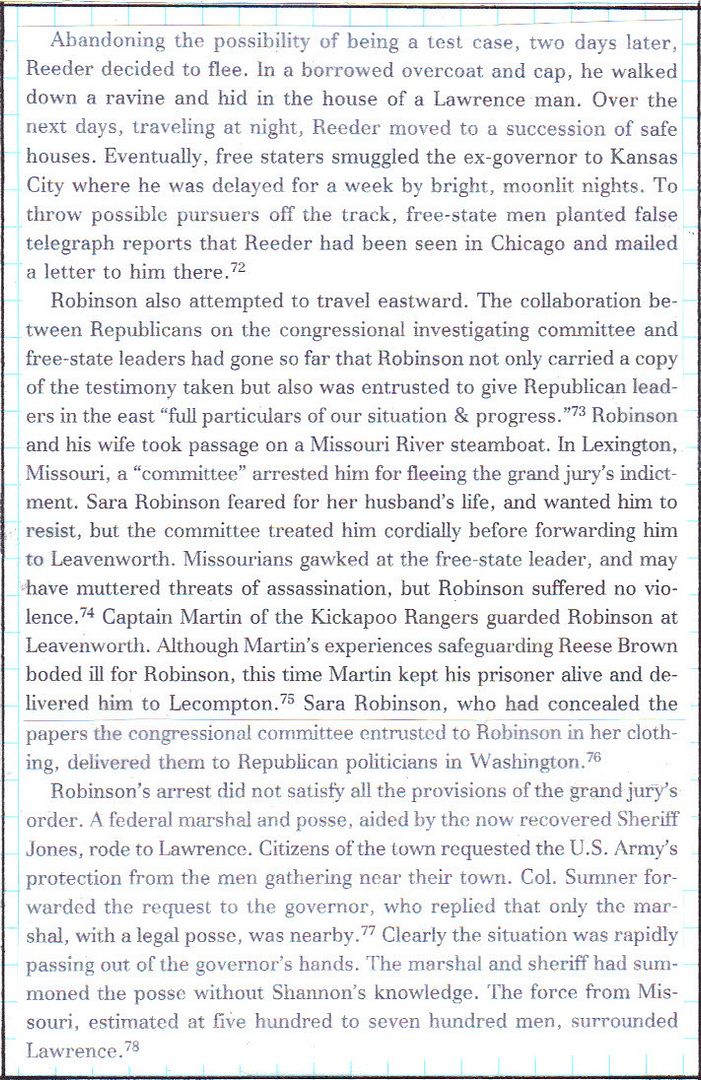
Nicole Etcheson, Bleeding Kansas: Contested Liberty in the Civil War Era
The Robinson farm was just west of Lawrence. They had no children and donated most of their estate to the University of Kansas, much of whose main campus stands on the former farm. Rock, chalk, Jayhawk, KU!
To the People of Massachusetts – 2
Liberty – 2
Freedom for Kansas – 2
Letter on Kansas – 2
Chicopee News – 2
I have been comparing and contrasting the 19th century arguments about slavery with our contemporary arguments about abortion. There are many similarities. For the advocates of both, they are absolutes. The slave owners and the abortionists will not accept any restrictions on their practice. Also, both slave owners and abortionists cannot morally defend their positions (abortionists tend to be atheists as well).
The biggest difference is the preemption of public policy debate by the Courts in the case of abortion, which is the biggest danger of judicial review/activism/supremacy. The debate over slavery was primarily conducted in Congress and in the public. Divisive, yes, but still a public debate. At least until Chief Justice Taney “settled” the issue in Dred Scott v. Sanford. In the case of abortion, the public debate never got very far before Justice Harry Blackmun inserted it into the Constitution, and limited the scope of the public debate, and shifted it to other grounds, such as composition of the Court. His decision, and that of the five justices who joined him, did more lasting damage to the Court as an institution by removing most of the judicial aspect of the Court, and making it just another political institution.
The Court is so far removed from this story Robert Bork told:
There is a story that two of the greatest figures in our law, Justice Holmes and Judge Learned Hand, had lunch together and afterward, as Holmes began to drive off in his carriage, Hand, in a sudden onset of enthusiasm, ran after him, crying, “Do justice, sir, do justice.” Holmes stopped the carriage and reproved Hand: “That is not my job. It is my job to apply the law.”
Great anecdote.
There has always been a political facet to Court decisions; they are not completely isolated from politics. For example, in Marbury v. Madison, one of the reasons that Chief Justice John Marshall ruled that Marbury was not entitled to his commission was the very real fear that had the Court ordered it be given, Madison would simply have ignored the order, and Court would be eviscerated from any sort of Constitutional purpose. Ironically, it was Madison himself who predicted such a vulnerability in Federalist No. 78.
Yet despite this, for most of its existence, the Court has tried to limit itself to rulings based on law, not politics. The few times it went out of bounds of the law to get a political or social outcome, the result was usually disastrous. Dred Scott and Plessy v. Ferguson are examples. I don’t include the Slaughterhouse cases; I don’t think that decision was political, it was just bad. It was the wrong case with the wrong facts interpreting a poorly drafted and poorly articulated clause of the 14th Amendment, argued at the wrong time in front of the wrong Court.
Even the Warren Court’s activism in selective incorporation was not necessarily political. I believe the incorporation of the Bill of Rights was exactly what was intended in the 14th Amendment’s Privileges and Immunities Clause, but because of the decision in the Slaughterhouse cases, selective incorporation was done under the Due Process clause instead. While it was a wrong legal basis, it got the intended result. Eventually.
Where the Court took a wrong turn was in the expansion of both “substantive due process” and the arrogation of the doctrine of “Judicial Supremacy” in Cooper v. Aaron. Substantive Due Process had been around since Allgeyer v. Louisiana in 1897, but only in the economic realm and not in the civil rights/liberties realm. Interestingly, it was in the same term that the Court began the process of selective incorporation with the 5th Amendment Takings Clause in Illinois Railway v. City of Chicago. Also an economic property rights case. However, in Allgeyer, the Court shouldn’t have had to create a notion of “substantive due process.” Under the facts of the case, it should have been the perfect case to apply the Article IV Privileges and Immunities clause and reach the same result. But the phrase “Privileges and Immunities” was killed so thoroughly in the Slaughterhouse Cases it killed it under Article IV, too.
While economic substantive due process died in West Coast Hotel v Parrish, the doctrine itself didn’t stay dead and came back to life late in term of the Warren Court in Griswold v. Connecticut. It gave a green light to the worst kind of subjective judicial activism, and since the Court said “our decisions are final” in Cooper v. Aaron, the Court abandoned it’s role as arbiter of the law and embarked on its role as a law making, but least democratic, institution. And in Roe v. Wade, it reached the height of political activism. What is bad is that when the Court makes these subjective substantive due process decisions, it is inherently making policy decisions. And it forecloses all future policy debate on the matter. If Congress makes a policy decision, that decision can always be politically reviewed, But not the decision of the Supreme Court; once it’s chiseled into our Constitutional Law, it is very difficult to reverse it. Because of judicial supremacy, the debate is closed.
Having become a political branch of government, membership in that branch inevitably became a bone of political contention, as Robert Bork found out. The fact that Jeffrey Toobin believes as he does is no surprise. And maybe he’s not wrong in the practical sense: what he described is exactly what the Court has become. That doesn’t mean that’s how it ought to be though.
Disclaimer: Opinions posted on Free Republic are those of the individual posters and do not necessarily represent the opinion of Free Republic or its management. All materials posted herein are protected by copyright law and the exemption for fair use of copyrighted works.